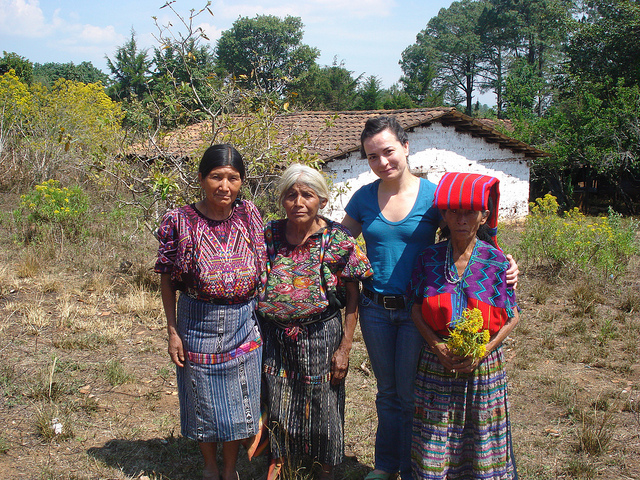GUATEMALA: Speaking Out on the Genocide of Indigenous Women
The 36 year long civil war (1960-1996) that ravaged Guatemala, left more than 200,000 people dead and at least 100,000 women raped: most of the victims were Mayan. Only recently have women started speaking out about the violence they suffered in hands of the Army and paramilitaries, and finally, the sexual violence perpetrated against Mayan women is being investigated as part of the genocide proceedings taking place in Spanish tribunals.

International Lawyer Almudena Bernabeu with Maria Toj and other survivors of Genocide in Guatemala. CC by Renata Ávila.
The documentary The Invisible Genocide of Women, by photojournalists Ofelia de Pablo and Javier Zurita gives us the harsh reality of female survivors who tell disturbing accounts of abuse, torture and violence, and also the efforts to advance with the ongoing forensic and legal investigation in the indictment of former Guatemalan President Efraín Ríos Montt.
The 2008 documentary Women, Violence, Silence by Javier Bauluz brings light to the story of Manuela, a single mother who works in a family integration center in Verapaz, one of the areas most affected by the 36 year civil war that ravaged the country. It is through Manuela's work that the reality of women's situation in Guatemala comes through the light.
In a country where there is an average of two women murdered daily women are under constant threat: the massive and organized violations they suffered during the conflicts, chauvinist violence, child abuse and discrimination based on gender and race are only some of the most important issues.
Patricia Simón of Periodismo Humano wrote about the terrible crimes committed against women during the Guatemalan genocide in Women, Violence and Silence in Guatemala featuring the eponymous documentary:
Las violaciones, las mutilaciones, la explotación sexual, las esterilizaciones a fuerza de violarlas y desgarrarlas, de provocarles abortos forzados, de feticidios -rajarles el vientre y sacar los fetos-, fueron torturas cometidas sistemáticamente por el Ejército y por los paramilitares contra estas mujeres. Mientras se lo hacían, como podrán ver en el Especial, les decían, por ser indígenas, “no son gente, son animales”. Muchas de estas mujeres nunca contaron estos crímenes y las que lo hicieron, o se supo en su comunidad, fueron rechazadas, despreciadas, expulsadas.
The reason these crimes are only recently seeing the light and being talked about in the genocide proceedings is, according to former Ad Hoc judge for the Inter-American Court of Human Rights Maria Eugenia Solís, that the UN, while investigating the genocide, failed to ask about these crimes, as if they weren't even possible. The only reason these abuses were documented is because women, when asked about other crimes, mentioned it collaterally when discussing the violence done to their husbands or other men in their families. And mostly, they kept this knowledge to themselves:
Organizations have been fighting this situation by organizing activities, festivals and meetings where survivors of rape during the armed conflict can speak out and receive support, such as the Regional Festival for Remembrance which took place in 2008 and 2011. This festival included activities exploring the topics of healing, empowerment, presentation of testimonies, open discussions, spaces for reflection, a Mayan ceremony as well as artistic and dancing activities to engage the women and help them feel empowered to work through their pain and unite with others to help put a stop to sexual violence.
Getting this story out is one of the steps towards justice for Guatemalan women who even after the civil war have not seen their lot improve. According to Women Today, in 2010 more than 685 women were murdered in Guatemala, placing it in the top spot for femicide in the Americas, above Ciudad Juarez in Mexico. Furthermore, only 1% of the cases gets to trial, and the person in charge of compensation for the victims of the civil war has stated he doesn't believe there were rapes. Lawyer Almudena Bernabeu, who took this case to the Spanish courts, underlines the importance of this process.
PeaceWomen.org is a project of the Women's International League of Peace and Freedom, United Nations Office.
Fair Use Notice: This page contains copyrighted material the use of which has not been specifically authorized by the copyright owner.
PeaceWomen.org distributes this material without profit to those who have expressed a prior interest in receiving the included information for research and educational purposes.
We believe this constitutes a fair use of any such copyrighted material as provided for in 17 U.S.C § 107.
